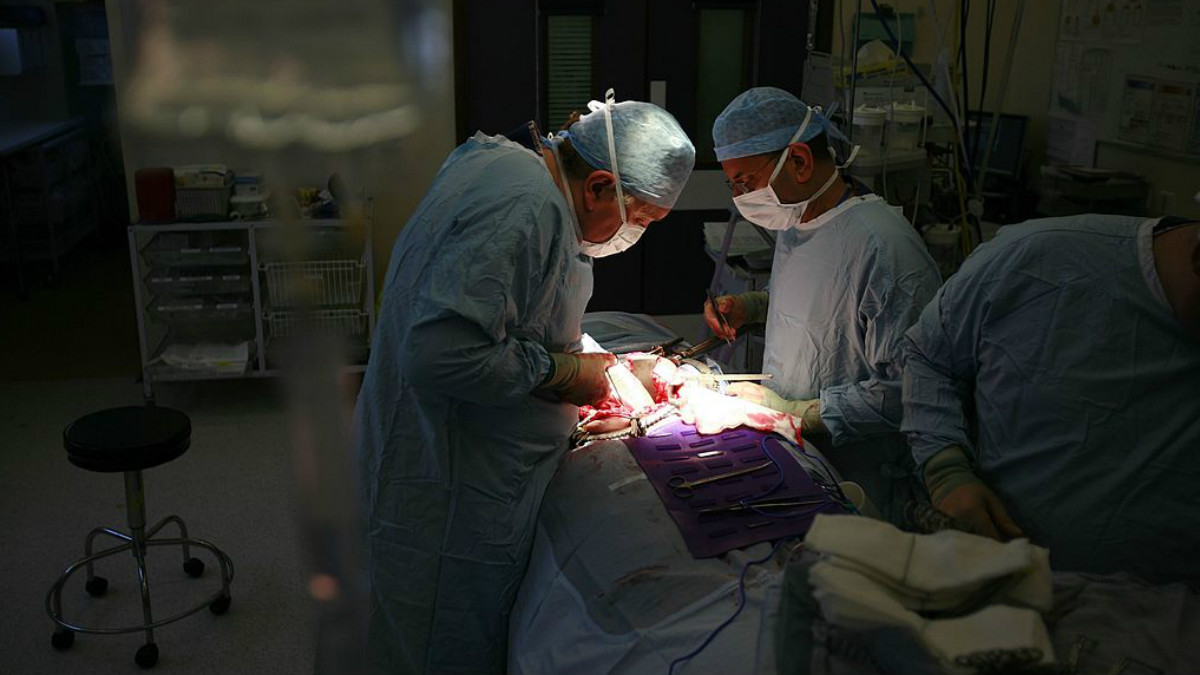NHS to share 1.6 million medical records with Google
DeepMind project will mine encrypted data to identify patients at risk of kidney failure

A free daily email with the biggest news stories of the day – and the best features from TheWeek.com
You are now subscribed
Your newsletter sign-up was successful
Up to 1.6 million NHS patients will have their medical records given to Google in an attempt to identify people at risk of health complications.
London's Royal Free NHS Trust, which runs three hospitals in the capital, will encrypt the data to prevent individual identification, according to a document seen by New Scientist.
Google's artificial intelligence medical project, DeepMind, will also receive details about drug overdoses, blood tests, HIV status and abortions in the past five years. The system will mine the data and predict which patients are at highest risk of acute kidney injury (AKI).
The Week
Escape your echo chamber. Get the facts behind the news, plus analysis from multiple perspectives.

Sign up for The Week's Free Newsletters
From our morning news briefing to a weekly Good News Newsletter, get the best of The Week delivered directly to your inbox.
From our morning news briefing to a weekly Good News Newsletter, get the best of The Week delivered directly to your inbox.
Usually occurring as a complication from another condition, AKI can result in anything from reduced function to total failure. Kidney Research UK estimates it affects one in six patients admitted to UK hospitals, contributing to around 40,000 deaths per year.
Ultimately, the Royal Free Trust and DeepMind want to develop an app that would provide medical staff with automated alerts about at-risk patients before they show signs of AKI. Artificial intelligence could run software that would notify doctors of a wide range of potential complications based on their patients' medical histories.
However, some patient advocacy groups expressed concern over the sharing of private medical data and the prospect of automated alerts.
Sam Smith, who runs health data privacy group MedConfidential, warned New Scientist of the long-term implications of the data-sharing: "What DeepMind is trying to do is build a generic algorithm that can do this for anything – anything you can do a test for. The big question is why they want it."
A free daily email with the biggest news stories of the day – and the best features from TheWeek.com
Joyce Robins, from Patient Concern, said it was "worrying that hospitals want to use software to identify an illness, rather than doctors".
Many others welcomed the new development, however, arguing that artificial intelligence will soon be a valuable tool for medics.
Graham Silk, of patient group Empower: Data4Health, stressed the need for appropriate privacy measures, but was otherwise enthusiastic about the project. "We're at the beginning of 21st-century medicine here," he told The Times.
-
 The Week contest: AI bellyaching
The Week contest: AI bellyachingPuzzles and Quizzes
-
 Political cartoons for February 18
Political cartoons for February 18Cartoons Wednesday’s political cartoons include the DOW, human replacement, and more
-
 The best music tours to book in 2026
The best music tours to book in 2026The Week Recommends Must-see live shows to catch this year from Lily Allen to Florence + The Machine
-
 A real head scratcher: how scabies returned to the UK
A real head scratcher: how scabies returned to the UKThe Explainer The ‘Victorian-era’ condition is on the rise in the UK, and experts aren’t sure why
-
 How dangerous is the ‘K’ strain super-flu?
How dangerous is the ‘K’ strain super-flu?The Explainer Surge in cases of new variant H3N2 flu in UK and around the world
-
 The ‘menopause gold rush’
The ‘menopause gold rush’Under the Radar Women vulnerable to misinformation and marketing of ‘unregulated’ products
-
 How the care industry came to rely on migrant workers
How the care industry came to rely on migrant workersThe Explainer Government crackdown on recruiting workers abroad risks deepening care sector crisis, industry leaders warn
-
 Could medics' misgivings spell the end of the assisted dying bill?
Could medics' misgivings spell the end of the assisted dying bill?Today's Big Question The Royal College of Psychiatrists has identified 'serious concerns' with the landmark bill – and MPs are taking notice
-
 Washwood Heath: Birmingham's pioneering neighbourhood health service
Washwood Heath: Birmingham's pioneering neighbourhood health serviceIn the Spotlight NHS England chair says there is a 'really good argument this is the model for the future'
-
 The UK's first legal drug consumption room
The UK's first legal drug consumption roomThe Explainer 'Potentially transformative moment in UK drugs policy' as The Thistle opens in Glasgow
-
 How can the UK solve the adult social care crisis?
How can the UK solve the adult social care crisis?Today's Big Question New commission announced to turn our buckling care sector around: yet more delay or finally a way forward?